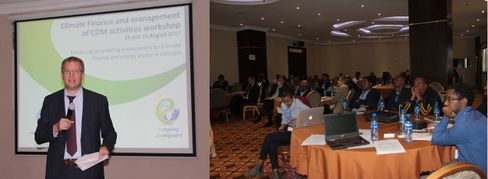Climate Finance and Management of CDM Activities Workshop Held in Ethiopia
Addis Ababa, 17 August 2017. Climate change is one of the greatest social, economic and environmental challenges of our time throughout the world. Human activities are the main causes of climate change. This, in turn, is having an impact, among others, on rainfall, temperatures, health, heritage and biodiversity. It is also vital to underline that it is difficult to precisely predict what the extents and impacts of climate change and variability will be, as they vary with each region.
As one of the most vulnerable countries in the world to climate change risk, the Government of Ethiopia is a frontrunner in the global climate change policy negotiations and plays a key role in the implementation of the Paris Agreement with its highly ambitious Climate Resilient Green Economy (CRGE) Strategy. Being the first Least Developed Country (LDC) to submit is Intended Nationally Determined Contribution (INDC) Ethiopia holds the chair of the LDC Group, comprised of 47 countries, as well as the Presidency of the Climate Vulnerable Forum. Nevertheless, the climate mitigation and adaptation activities deriving from the CRGE strategy need to have sufficient finance. Against this background, GIZ Energising Development (EnDev) jointly with the Ethiopia Ministry of Environment, Forest and Climate Change (MEFCC) has organised a two day’s workshop on Climate Finance and Clean Development Mechanism from 15 and 16 August 2017 in Addis Ababa.
The workshop was part of a long-term capacity building of EnDev Ethiopia in collaboration with Irish Aid for respective governmental institutions and stakeholders. With the support of the UNFCCC Regional Collaboration Centre in Kampala, giving technical input and supporting the organising of the workshop, another step was made for Ethiopia to successfully benefit from climate finance to achieve its ambitious targets.
Mr Abiy Hailegebriel, Climate Change Planning and Implementation Directorate Director, MEFCC, says in his opening remark. ’’Climate Finance is critical to address climate change because a large-scale investment is required to significantly reduce emissions, notably in sectors that emit large quantities of greenhouse gases’’. Mr Patrick McManus, Acting ambassador of Ireland in Ethiopia added, ’As climate change is a worldwide challenge, International Climate Finance is vital in the global effort to prevent worsening climate change and to assist countries to adapt to current impacts’’.
Climate Finance refers to local, national or transnational financing, which may be drawn from public and private sources for climate adaptation and mitigation measures. Significant financial investments - from both public and private sources - guided by smart and equitable policies are required to transition the world’s economy to a low-carbon path, reduce greenhouse gas concentrations to safe levels, and build the resilience of vulnerable countries to climate change.
It is evident that in order to access the Climate Finance for any climate related projects both public institutions and private sector need a good understanding of the changing policies under the Paris Agreement. The workshops aimed to enhance knowledge and in depth understanding of the current Climate Finance landscape. It was also presented how Ethiopia’s renewable energy access programs can best benefit from Climate Finance.
The workshop was attended by officials from the Ethiopian Government, Irish Aid, EU, WFP, experts from UNFCCC RCC; International Climate Finance consultants, private sector and NGOs working on the ground. This unique mix of participants brought different experiences and information from different views and fruitful interaction during and on the side of the workshop. Finally, it was agreed to use this successful workshop as a launch of a new Climate Finance knowledge sharing platform in order to streamline the activities of different stakeholders in Ethiopia. The workshop is concluded by the establishment of a platform steered by the MEFCC.
By: Dawit Dagnew email:dawit.dagnew@giz.de





















